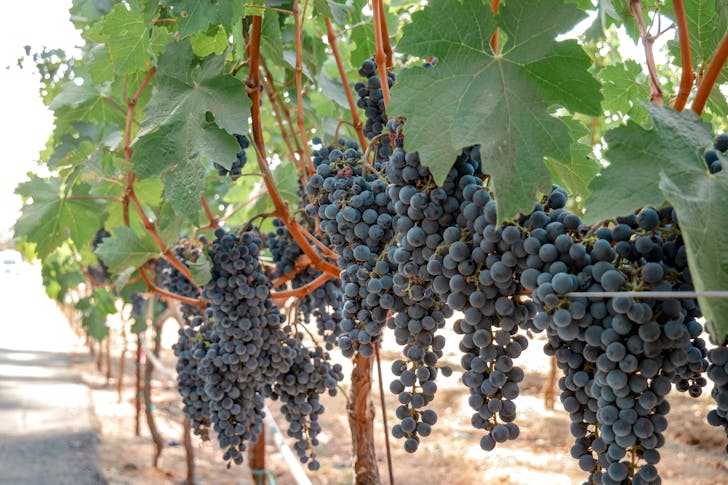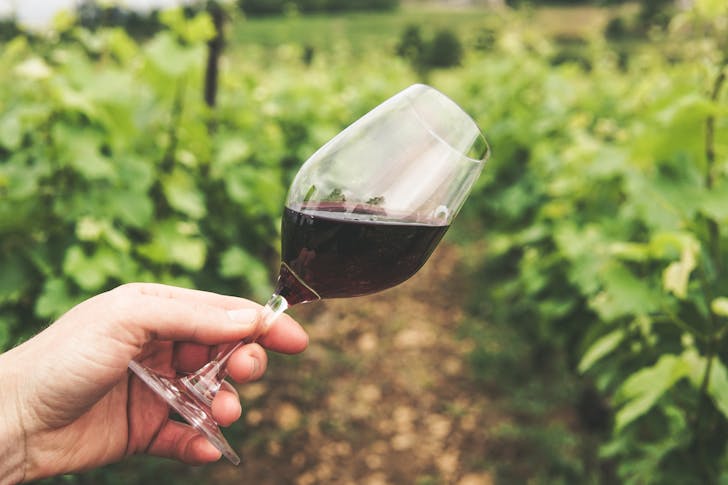
Why Wine Vineyards Are Ripping Out Their Fields in California

Wine vineyards across California are in trouble. Too much supply and too little demand are pushing vineyard owners to rip out their fields. Grapes once destined to become premium wines are now being left to rot, marking a dramatic shift in the industry.
Global wine consumption has dropped significantly, and growers are feeling the pressure. Take Garret Schaefer, a vineyard owner in California. This year, 50 acres of his grapes – roughly 400 tons – have been left to rot.
Why Are Wine Vineyards Ripping Out Their Fields?
The wine market is grappling with a perfect storm of problems. Inflation has driven prices through the roof. According to the Federal Reserve, the price of wine has jumped more than 13% in the last five years. Consumers feel the pinch, and many are opting out of that expensive bottle of red or white.

Irma / Pexels / According to reports, the price of wine has jumped more than 13% in the last five years.
Then came the World Health Organization’s alarming statement: No level of alcohol is safe. That sent shockwaves across the wine industry. Health-conscious consumers started to rethink their drinking habits.
The younger generation does not drink as much wine as their baby boomer parents did. Instead, they are flocking to non-alcoholic drinks, low-calorie sodas, and trendy sparkling waters.
How Bad Is It for Wine Vineyards?
California, which grows 80% of America’s wine grapes, is bearing the brunt of this shift. Experts say the oversupply issue is so severe that farmers need to rip out 50,000 acres of vineyards, 8% of the state’s total. For growers like Don Worley, that means work, but not the kind they are proud of.
Worley has been clearing vineyards for decades, usually helping farmers remove diseased vines. Now, he is being hired to tear out healthy ones. Massive machines plow through row after row, clearing 30 acres a day. It is quick, efficient, and devastating.
Garret Schaefer’s family has been growing grapes since 1894. But even he has had to make painful cuts. He has already ripped out one-third of his family’s vineyards. The workers who once kept those fields thriving are also gone. “We used to have six to eight full-time employees. We are down to two,” Schaefer explained.
It is a grim outlook for an industry that relies on tradition, hard work, and community.
New Drinking Habits
Millennials and Gen Z have changed the way we drink. Young consumers like Brianda Gonzalez are skipping traditional wines altogether. Gonzalez, who runs a shop in California, said she realized regular wine consumption didn’t align with her health goals. Now, she focuses on non-alcoholic alternatives, and her customers seem to agree.

Grape Things / Pexels / The problem is simple: There is not enough demand for traditional anymore – as Gen Z and millennials have become more health conscious.
Non-alcoholic beverages are booming, offering everything from sparkling water to zero-proof wines. These options cater to younger drinkers who want to be social but still prioritize their health. For wine vineyards, this trend is another blow. Their customer base is shrinking while competition for shelf space grows fiercer.
Baby boomers, once the wine industry’s biggest supporters, are not buying as much either. Aging populations, changing tastes, and tighter wallets mean fewer people are enjoying that nightly glass of Merlot or Chardonnay.
Is Inflation Making Wine Too Expensive?
Inflation is squeezing everyone, and wine vineyards are not immune. Rising production costs, from labor to packaging, have driven prices higher. A bottle that once cost $10 now sells for $15 or more, and consumers are noticing. In tough economic times, wine becomes a luxury many people can not justify.
Vineyard owners are feeling the pinch on both ends. They are spending more to produce wine while selling less of it. With warehouses packed full of unsold bottles, there is little incentive to keep growing grapes. Some farmers face the heartbreaking decision to rip out vines that have been in their families for generations.
More in Luxury & Life Style
-
`
What’s Changing for Student Loans After Trump’s New Spending Bill?
The passing of President Donald Trump’s latest spending bill is shaking up more than just tax brackets and business deductions—it’s poised...
July 16, 2025 -
`
Why Big Tech Is Divided on the Future of Artificial General Intelligence
Fifteen years ago, the founders of DeepMind—Sir Demis Hassabis, Mustafa Suleyman, and Shane Legg—set a bold goal: “Build the world’s first...
July 1, 2025 -
`
Planning a Wedding? These Money-Saving Tips Actually Work
Weddings are meant to be memorable, not financially draining. But for many couples, the cost of tying the knot often brings...
June 24, 2025 -
`
Did MrBeast Really Borrow Money From His Mother for His Wedding?
YouTube star Jimmy Donaldson, widely known as MrBeast, sparked surprise when he shared a personal update on X. Despite leading the...
June 17, 2025 -
`
How Smart Technology Is Changing the Way We Travel
Technology has reshaped nearly every part of modern life, and travel is no exception. From how we plan trips to how...
June 12, 2025 -
`
Why Some Tech CEOs Are Replacing Themselves With AI Avatars
In a move that signals a shift in how corporate communication is handled, major tech CEOs are beginning to hand the...
June 3, 2025 -
`
Is Innovation Dead in American Pop Culture?
Has something changed in the way we engage with American pop culture? Scroll through your favorite streaming service, tune into the...
May 27, 2025 -
`
7 Key Steps to Start a Profitable Digital Products Business
Starting a digital products business offers an exciting opportunity to turn your skills and knowledge into a revenue-generating venture. Whether you’re...
May 20, 2025 -
`
Mercedes-Benz Introduces the Vision V – An Ultra-Luxury Electric Limousine
The introduction of Mercedes-Benz’s Vision V concept represents a significant advancement in the field of electric vehicles. This electric minivan is...
May 13, 2025














You must be logged in to post a comment Login